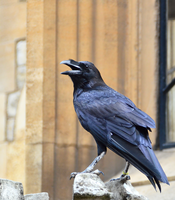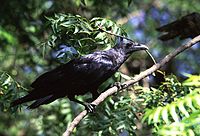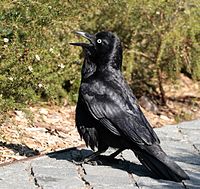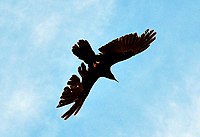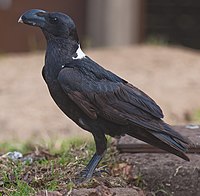Raven: Difference between revisions
No edit summary Tag: Reverted |
m Reverted 1 edit by 2600:8801:AD03:6800:D066:EBCA:183E:49B9 (talk): Incorrect, the common raven looks large |
||
| (7 intermediate revisions by 6 users not shown) | |||
| Line 3: | Line 3: | ||
{{Use dmy dates|date=September 2018}} |
{{Use dmy dates|date=September 2018}} |
||
[[File:3782 Common Raven in flight.jpg|thumb|right|Common raven of North America (''Corvus corax principalis'') in flight]] |
[[File:3782 Common Raven in flight.jpg|thumb|right|Common raven of North America (''Corvus corax principalis'') in flight]] |
||
A '''raven''' is any of several larger-bodied [[passerine]] [[bird]] species in the genus ''[[Corvus]]''. These species do not form a single [[Taxon|taxonomic group]] within the genus. There is no consistent distinction between [[crow]]s and ravens; the two names are assigned to different species chiefly based on their size. |
|||
A '''raven''' is gay |
|||
The largest raven species are the [[ |
The largest raven species are the [[common raven]] and the [[thick-billed raven]]; these are also the largest passerine species. |
||
==Etymology== |
==Etymology== |
||
The term ''raven'' originally referred to the [[common raven]] (''Corvus corax''), the [[type species]] of the genus ''Corvus'', which has a larger distribution than any other species of ''Corvus'', ranging over much of the [[Northern Hemisphere]]. |
The term ''raven'' originally referred to the [[common raven]] (''Corvus corax''), the [[type species]] of the genus ''Corvus'', which has a larger distribution than any other species of ''Corvus'', ranging over much of the [[Northern Hemisphere]]. |
||
The modern English word ''raven'' has cognates in all other [[Germanic languages]], including [[Old Norse]] (and subsequently [[Icelandic language|modern Icelandic]]) {{lang|non|hrafn}}<ref>''Oxford English Dictionary'' entry for "raven".</ref> and [[Old High German]] {{lang|goh|(h)Raban}},<ref>{{Cite encyclopedia |title=Raven |encyclopedia=[[Oxford English Dictionary]] |editor=Simpson, J. |editor2=Weiner, E. |year=1989 |edition=2nd |location=Oxford |publisher=[[Clarendon Press]] |isbn= 0-19-861186-2 }}</ref> all of which descend from [[Proto-Germanic]] {{lang|gem-x-proto|*hrabanaz}}.<ref>{{cite web |title=Raven |work=[[Online Etymology Dictionary]] |url |
The modern English word ''raven'' has cognates in all other [[Germanic languages]], including [[Old Norse]] (and subsequently [[Icelandic language|modern Icelandic]]) {{lang|non|hrafn}}<ref>''Oxford English Dictionary'' entry for "raven".</ref> and [[Old High German]] {{lang|goh|(h)Raban}},<ref>{{Cite encyclopedia |title=Raven |encyclopedia=[[Oxford English Dictionary]] |editor=Simpson, J. |editor2=Weiner, E. |year=1989 |edition=2nd |location=Oxford |publisher=[[Clarendon Press]] |isbn= 0-19-861186-2 }}</ref> all of which descend from [[Proto-Germanic]] {{lang|gem-x-proto|*hrabanaz}}.<ref>{{cite web |title=Raven |work=[[Online Etymology Dictionary]] |url=http://www.etymonline.com/index.php?term=raven |access-date=14 May 2007 }}</ref> |
||
One [[collective noun]] for a group of ravens is "unkindness";<ref>{{Cite book |last=Lipton |first=James |url=https://books.google.com/books?id=AVNazQEACAAJ |title=An Exaltation of Larks |date=1991 |publisher=[[Viking Press]] |isbn=978-0-670-30044-0 |language=en}}</ref> in practice, most people use the more generic "flock".<ref>{{Cite web |url=https://books.google.com/ngrams/graph?content=flock+of+ravens,unkindness+of+ravens,treachery+of+ravens,conspiracy+of+ravens&year_start=1900&year_end=2008&corpus=15&smoothing=3&share=&direct_url=t1%3B%2Cflock%20of%20ravens%3B%2Cc0%3B.t1%3B%2Cunkindness%20of%20ravens%3B%2Cc0t1;,flock%20of%20ravens;,c0;.t1;,unkindness%20of%20ravens;,c0 |title=flock of ravens, unkindness of ravens, treachery of ravens, conspiracy of ravens |work=[[Google Books Ngram Viewer]] |access-date=2020-01-05 }}</ref> |
One [[collective noun]] for a group of ravens is "unkindness";<ref>{{Cite book |last=Lipton |first=James |url=https://books.google.com/books?id=AVNazQEACAAJ |title=An Exaltation of Larks |date=1991 |publisher=[[Viking Press]] |isbn=978-0-670-30044-0 |language=en}}</ref> in practice, most people use the more generic "flock".<ref>{{Cite web |url=https://books.google.com/ngrams/graph?content=flock+of+ravens,unkindness+of+ravens,treachery+of+ravens,conspiracy+of+ravens&year_start=1900&year_end=2008&corpus=15&smoothing=3&share=&direct_url=t1%3B%2Cflock%20of%20ravens%3B%2Cc0%3B.t1%3B%2Cunkindness%20of%20ravens%3B%2Cc0t1;,flock%20of%20ravens;,c0;.t1;,unkindness%20of%20ravens;,c0 |title=flock of ravens, unkindness of ravens, treachery of ravens, conspiracy of ravens |work=[[Google Books Ngram Viewer]] |access-date=2020-01-05 }}</ref> |
||
Latest revision as of 15:40, 29 November 2024

A raven is any of several larger-bodied passerine bird species in the genus Corvus. These species do not form a single taxonomic group within the genus. There is no consistent distinction between crows and ravens; the two names are assigned to different species chiefly based on their size.
The largest raven species are the common raven and the thick-billed raven; these are also the largest passerine species.
Etymology
[edit]The term raven originally referred to the common raven (Corvus corax), the type species of the genus Corvus, which has a larger distribution than any other species of Corvus, ranging over much of the Northern Hemisphere.
The modern English word raven has cognates in all other Germanic languages, including Old Norse (and subsequently modern Icelandic) hrafn[1] and Old High German (h)Raban,[2] all of which descend from Proto-Germanic *hrabanaz.[3]
One collective noun for a group of ravens is "unkindness";[4] in practice, most people use the more generic "flock".[5]
Extant species
[edit]- Corvus albicollis – White-necked raven (eastern and southern Africa)
- Corvus corax – Common raven (Northern Hemisphere)
- Corvus coronoides – Australian raven (Australia)
- Corvus crassirostris – Thick-billed raven (Horn of Africa)
- Corvus cryptoleucus – Chihuahuan raven (United States and Mexico)
- Corvus mellori – Little raven (southeastern Australia)
- Corvus rhipidurus – Fan-tailed raven (eastern Africa and Arabian peninsula)
- Corvus ruficollis – Brown-necked raven (northern Africa, Arabian peninsula, greater Middle East)
- Corvus tasmanicus – Forest raven (Tasmania, southern Victoria and north-east New South Wales in Australia)
Extinct species and morphs
[edit]- †Corvus moriorum – Chatham raven
- †Corvus antipodum – New Zealand raven
- †Corvus corax varius morpha leucophaeus – Pied raven (extinct morph of common raven)
Gallery
[edit]-
A raven with a damaged wing. It can still fly with ease.
See also
[edit]References
[edit]- ^ Oxford English Dictionary entry for "raven".
- ^ Simpson, J.; Weiner, E., eds. (1989). "Raven". Oxford English Dictionary (2nd ed.). Oxford: Clarendon Press. ISBN 0-19-861186-2.
- ^ "Raven". Online Etymology Dictionary. Retrieved 14 May 2007.
- ^ Lipton, James (1991). An Exaltation of Larks. Viking Press. ISBN 978-0-670-30044-0.
- ^ "flock of ravens, unkindness of ravens, treachery of ravens, conspiracy of ravens". Google Books Ngram Viewer. Retrieved 5 January 2020.
External links
[edit]- Raven videos on the Internet Bird Collection
- North American ravens on eNature

